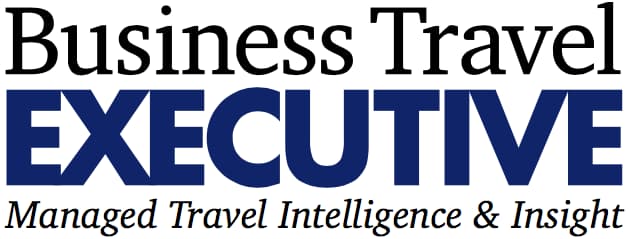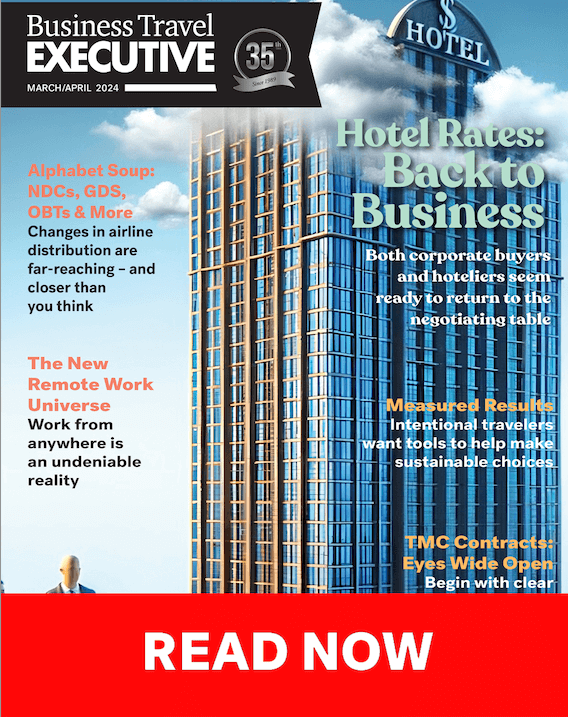Forward Thrust
UATP President and CEO Ralph Kaiser outlines today’s expanded options and the future trends in global payment solutions

You might expect an entity that's been around since 1936 to have something of an old-fashioned outlook. But that's certainly not the case with UATP, a global payment solution owned and operated by the world's airlines which continues to enhance its offerings. Accepted as a form of payment for corporate business travel worldwide by airlines, travel agencies and Amtrak, UATP accounts are issued by Air Canada, Air China, American Airlines, BCD Travel, Delta Air Lines and WestJet, to name just a few.
Of particular interest to corporate travel managers, the data tools offered by UATP – DataStream and DataMine – provide comprehensive account details for accurate travel management to issuers and corporate subscribers.
UATP has made recent news with moves that continue to expand options for users. For example, a strategic partnership with B2B airfare aggregators Mystifly, announced earlier this year, focuses on reducing the cost of acceptance for travel payments. Similarly, the integration of UATP into Uber Wallet is aimed at enabling travelers to use UATP accounts for rides with Uber as well as orders through Uber Eats.
Business Travel Executive sat down with Ralph A. Kaiser, president, CEO and chairman of UATP, to get an inside look at what to expect from this going forward. Kaiser, who has served in this role since 2003, has spearheaded a number of growth initiatives that have more than doubled network charge volume to over $18 billion.
Before taking on the CEO role, Kaiser served as UATP’s general counsel. Prior to that, his experiences included positions at the Overseas Private Investment Corporation (OPIC) and the Export-Import Bank of the US.
BTE: Looking back on the history of your company, how would you describe the changes it has undergone in recent years?
KAISER: Over the past two decades UATP has vastly expanded its charge card and processing programs to nearly $20 billion in volume (pre-pandemic). UATP’s Issuer and Merchant Network has increased considerably in the past 10 years. In 2019, UATP opened issuance to travel agencies as part of the Limited Participation Issuer (LPI) program. The Alternative Forms of Payment (AFP) processing line of business has been crucially significant for the network’s growth. AFP processing began in 2007 with PayPal and has since grown to 20 processing partners with connections to over 300 AFPs across the globe. And most recently in 2021, UATP built UATP One Merchant Services (PSP), a new line of business for the network. The PSP services allow airlines to lower their cost of acceptance according to payment type, country, and payment service provider, while at the same time increasing acceptance rates. UATP has continually expanded across all businesses and markets.
BTE: Among those initiatives, which one would you say is having the greatest effect for UATP?
KAISER: The success of AFP processing is one of the most important developments within UATP in recent years. The AFP processing program has expanded massively and continues to grow. In fact, it has far exceeded pre-pandemic results for almost two years now. The goal now is to replicate this success with UATP One Merchant Services, which is quickly becoming known in the industry for its optimal service and cost levels.
BTE: How would you describe your focus on partnerships with other companies?
KAISER: UATP’s relationships with other companies are crucial for the network. UATP is owned globally by airlines, and partnerships with airlines and other FINTECH companies is the key to our business. Connecting with AFPs such as PayPal and Uplift has greatly increased the transaction growth for our airline members in the leisure sector. UATP is also in the process of new technology launches, including the ATCAN system which is core technology behind all of UATP’s programs. Over the years UATP has evaluated multiple options, build, partner or outsource. A combination of these have been used strategically to keep UATP best-in-breed technologically, and to continue to expand the network usage. There is going to be further expansion in the coming months.
BTE: What was the impact of the pandemic on your operations and how has it affected UATP’s progress?
KAISER: In a span of months, we went from having the most successful year in UATP history in 2019, to what was followed by the most difficult year for the UATP Network. UATP took this time, however, to develop new products and enhance the network allowing for new growth once the world returned to travel. UATP developed its unused ticket credit platform which quickly became the industry norm for the massive amounts of ticket credits around the world. It has been a tough 18 to 24 months for the industry, but we are all seeing improvements through 2022 and are looking forward to great success in the future.
BTE: As you talk with corporate travel managers, what is the one thing you would want them to know about your company?
KAISER: UATP is the best corporate charge card product available. UATP’s legacy offers reliability to corporate travel managers through a closed loop network and direct connections and relationships with the airlines. The Level III data from UATP provides the best detailed data in the industry which helps travel managers provide the duty-of-care their travelers deserve. UATP also offers travel managers a more simplified reconciliation process and has a state-of-the-art refund program.
BTE: What do you think the future looks like for UATP over the next three to five years?
KAISER: We hope to see the continual success and growth of the charge card programs, with a diverse group of Issuers that goes beyond airlines, and AFP processing, as well as the expansion of PSP services, UATP One. During the pandemic, UATP’s unused ticket credit solution helped airlines globally, and we hope becomes an industry norm for all refunds moving forward. We also have plans to utilize the network for other B2B processing offerings.
UATP is committed to its Members and staff and will strive to offer best in class technology and service building on the high level of good will established with all constituents over many decades. n
Of particular interest to corporate travel managers, the data tools offered by UATP – DataStream and DataMine – provide comprehensive account details for accurate travel management to issuers and corporate subscribers.
UATP has made recent news with moves that continue to expand options for users. For example, a strategic partnership with B2B airfare aggregators Mystifly, announced earlier this year, focuses on reducing the cost of acceptance for travel payments. Similarly, the integration of UATP into Uber Wallet is aimed at enabling travelers to use UATP accounts for rides with Uber as well as orders through Uber Eats.
Business Travel Executive sat down with Ralph A. Kaiser, president, CEO and chairman of UATP, to get an inside look at what to expect from this going forward. Kaiser, who has served in this role since 2003, has spearheaded a number of growth initiatives that have more than doubled network charge volume to over $18 billion.
Before taking on the CEO role, Kaiser served as UATP’s general counsel. Prior to that, his experiences included positions at the Overseas Private Investment Corporation (OPIC) and the Export-Import Bank of the US.
BTE: Looking back on the history of your company, how would you describe the changes it has undergone in recent years?
KAISER: Over the past two decades UATP has vastly expanded its charge card and processing programs to nearly $20 billion in volume (pre-pandemic). UATP’s Issuer and Merchant Network has increased considerably in the past 10 years. In 2019, UATP opened issuance to travel agencies as part of the Limited Participation Issuer (LPI) program. The Alternative Forms of Payment (AFP) processing line of business has been crucially significant for the network’s growth. AFP processing began in 2007 with PayPal and has since grown to 20 processing partners with connections to over 300 AFPs across the globe. And most recently in 2021, UATP built UATP One Merchant Services (PSP), a new line of business for the network. The PSP services allow airlines to lower their cost of acceptance according to payment type, country, and payment service provider, while at the same time increasing acceptance rates. UATP has continually expanded across all businesses and markets.
BTE: Among those initiatives, which one would you say is having the greatest effect for UATP?
KAISER: The success of AFP processing is one of the most important developments within UATP in recent years. The AFP processing program has expanded massively and continues to grow. In fact, it has far exceeded pre-pandemic results for almost two years now. The goal now is to replicate this success with UATP One Merchant Services, which is quickly becoming known in the industry for its optimal service and cost levels.
BTE: How would you describe your focus on partnerships with other companies?
KAISER: UATP’s relationships with other companies are crucial for the network. UATP is owned globally by airlines, and partnerships with airlines and other FINTECH companies is the key to our business. Connecting with AFPs such as PayPal and Uplift has greatly increased the transaction growth for our airline members in the leisure sector. UATP is also in the process of new technology launches, including the ATCAN system which is core technology behind all of UATP’s programs. Over the years UATP has evaluated multiple options, build, partner or outsource. A combination of these have been used strategically to keep UATP best-in-breed technologically, and to continue to expand the network usage. There is going to be further expansion in the coming months.
BTE: What was the impact of the pandemic on your operations and how has it affected UATP’s progress?
KAISER: In a span of months, we went from having the most successful year in UATP history in 2019, to what was followed by the most difficult year for the UATP Network. UATP took this time, however, to develop new products and enhance the network allowing for new growth once the world returned to travel. UATP developed its unused ticket credit platform which quickly became the industry norm for the massive amounts of ticket credits around the world. It has been a tough 18 to 24 months for the industry, but we are all seeing improvements through 2022 and are looking forward to great success in the future.
BTE: As you talk with corporate travel managers, what is the one thing you would want them to know about your company?
KAISER: UATP is the best corporate charge card product available. UATP’s legacy offers reliability to corporate travel managers through a closed loop network and direct connections and relationships with the airlines. The Level III data from UATP provides the best detailed data in the industry which helps travel managers provide the duty-of-care their travelers deserve. UATP also offers travel managers a more simplified reconciliation process and has a state-of-the-art refund program.
BTE: What do you think the future looks like for UATP over the next three to five years?
KAISER: We hope to see the continual success and growth of the charge card programs, with a diverse group of Issuers that goes beyond airlines, and AFP processing, as well as the expansion of PSP services, UATP One. During the pandemic, UATP’s unused ticket credit solution helped airlines globally, and we hope becomes an industry norm for all refunds moving forward. We also have plans to utilize the network for other B2B processing offerings.
UATP is committed to its Members and staff and will strive to offer best in class technology and service building on the high level of good will established with all constituents over many decades. n
Categories: Special ReportIndustry Interview
Publishing Office:
Three Silver Star Court
Unit 1
Vernon, NJ 07462
973-839-6200
JAllison@askbte.com
Editorial Office:
5768 Remington Drive
Winston-Salem, NC 27104
336-766-1961
DBooth@askbte.com
Subscription Services:
P.O. Box 542
Pompton Plains, NJ 07444
973-839-0620
subscriptions@askbte.com








